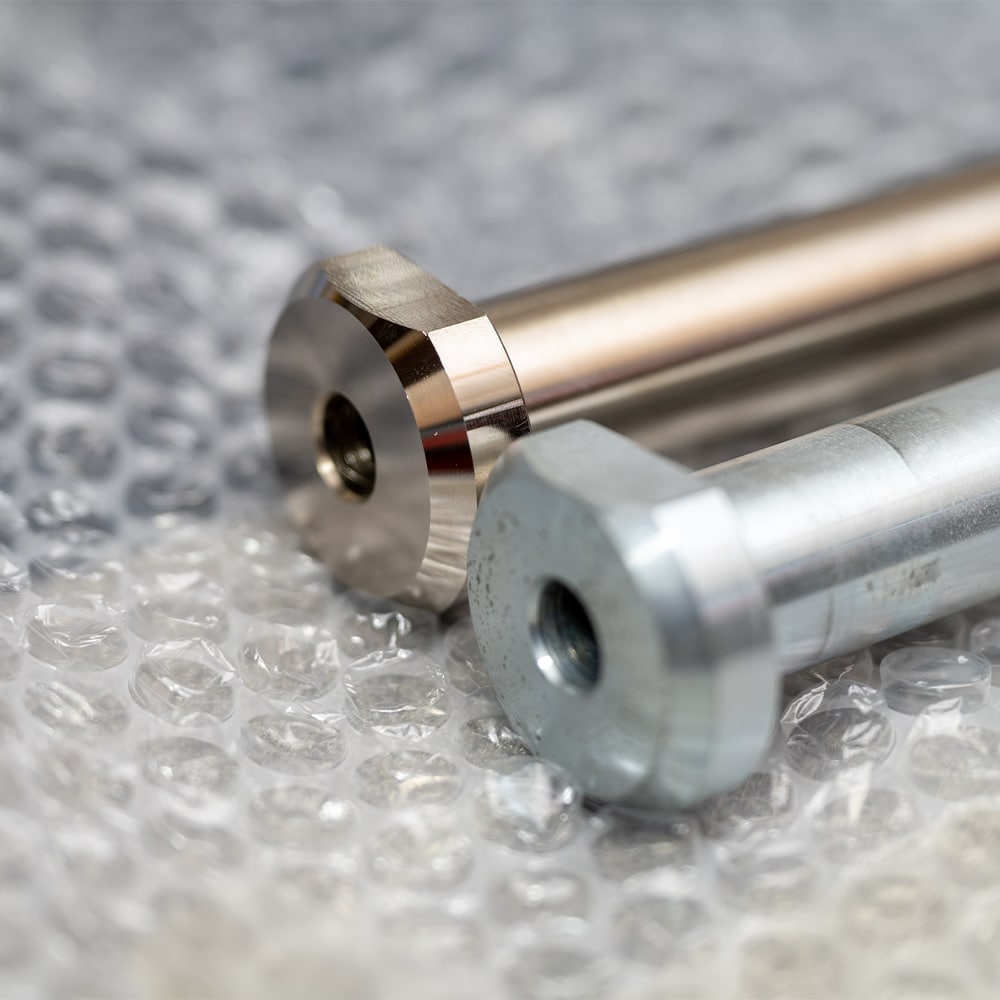Armoloy Specifications
What is ASTM B733?
ASTM B733 is the standard for electroless nickel-phosphorus coatings on metal surfaces. It is commonly used as a supporting standard within larger specifications, such as AMS 2404 or MIL-C-26074, that define electroless nickel plating requirements for aerospace, defense, and industrial applications.
These coatings are applied through an autocatalytic reaction, ensuring uniform coverage on complex geometries without electricity. The standard categorizes coatings by their phosphorus levels, each designed for specific applications:
- Type-I: No set phosphorus level for general use.
- Type-II: 1–3% phosphorus for solderability and conductivity in electronics.
- Type-III: 2–4% phosphorus for high hardness and wear resistance.
- Type-IV: 5–9% phosphorus for versatile wear and corrosion protection.
- Type-V: Over 10% phosphorus for superior corrosion resistance and non-ferromagnetic properties (>11.2%).
Thickness requirements range from SC0 (0.1 µm) for basic protection to SC4 for extreme conditions. Heat treatment classes further enhance adhesion and hardness with tailored processes for materials like steel, aluminum, and titanium:
- Class 1: As-deposited (no heat treatment).
- Class 2: Heat treatment up to 400 °C to reach a minimum hardness of 850 HK.
- Classes 3-6: Heat treatments for adhesion on materials like steel, aluminum, and titanium.

The Role of ASTM B733 in Electroless Nickel-Phosphorous Coatings
ASTM B733 addresses engineering challenges for electroless nickel-phosphorus coatings. Its key roles include:
- Coating Complex Surfaces: Ensures uniform coverage on intricate and irregular surfaces for reliable protection.
- Tailoring Coating Performance: Categorizes coatings by phosphorus levels and thickness to meet specific performance requirements.
- Preventing Corrosion: Establishes standards for high-phosphorus coatings that resist salts, acids, and other harsh environments.
- Enhancing Material Compatibility: Defines processes for coating diverse substrates like steel, aluminum, and titanium to ensure strong adhesion and long-term durability.
- Improving Hardness and Adhesion: Specifies heat treatments that enhance wear resistance and bonding strength.
ASTM B733-compliant coatings provide proven protection against wear, corrosion, and environmental stress, making them indispensable for demanding applications.

ASTM B733 Testing Methodology & Results
ASTM B733 verifies the quality of electroless nickel-phosphorus coatings through various tests, including:
Coating Thickness Testing
- Microscopical Examination: Cross-sectional analysis for precise thickness measurements.
- Magnetic Induction: Non-destructive testing for non-magnetic coatings on magnetic substrates.
- X-Ray Spectrometry: Accurate thickness measurement using X-rays.
- Beta Backscatter: Uses beta radiation to determine coating depth.
- Coulometric Method: Electrochemical process that measures the dissolved coating to assess thickness
Adhesion Testing
- Bend Test: Checks for flaking or detachment by bending samples.
- Impact Test: Tests coatings durability by applying a controlled force.
- Thermal Shock Test: Exposes coatings to temperature changes to test bond strength.
Porosity Testing
- Ferroxyl Test: Identifies tiny pores in coatings using a color-changing reaction.
- Boiling Water Test: Immerses coatings in boiling water to detect defects.
- Aerated Water Test: Uses aerated water to highlight coating flaws.
- Alizarin Test: Reveals porosity with a chemical reaction that stains porous areas.
Heat Treatment Verification
Inspections confirm proper adhesion and hardness through post-coating heat treatments tailored to substrate materials.
ASTM B733 ensures that electroless nickel-phosphorus coatings provide reliable protection against corrosion, wear, and environmental stress, giving manufacturers confidence in their performance.

Industries that Use ASTM B733
Many industries rely on ASTM B733 to improve component performance and longevity, including:
- Semiconductors: Provides solderability and conductivity for delicate components such as connectors, circuit boards, and sensors.
- Oil and Gas: Protects equipment like pumps, valves, and drilling tools from corrosion caused by harsh environments and chemical exposure.
- Medical Devices: Ensures durable coatings on surgical instruments, implants, and diagnostic tools.
- Injection Molding: Increases the durability of molds and tooling, supporting high-volume production with improved wear resistance and reduced maintenance needs.
- Textiles: Applies durable coatings to machinery components like rollers and spindles, improving resistance to wear and chemical exposure.
By following ASTM B733, these industries benefit from coatings that enhance performance, reliability, and service life, even under the most challenging conditions.

Benefits of Working with an ASTM B733 Provider
Custom coatings
Get coatings tailored to your specific needs for wear resistance, corrosion protection, or conductivity
Consistent quality
Providers deliver reliable, uniform coatings for all types of parts and geometries
Longer lasting parts
Certified coatings extend component life and reduce wear in tough environments
Standards compliance
Meet industry requirements with coatings that align with ASTM B733 and other regulations
Advanced testing
Providers use advanced tests to confirm coating thickness, adhesion, and durability
Expert guidance
Work with specialists to choose the best materials and coatings for your application
Lower costs
Durable coatings reduce downtime and maintenance expenses over time
Proven performance
Feel confident that your coated parts will perform well, even in demanding conditions

Specifications at Armoloy
Armoloy offers plating solutions that meet ASTM B733 to support both regulatory compliance and individual project needs. Explore common specifications and accreditations we work with, and contact us to find the right solution for your application.
Disclaimer
The information provided on this page, including any descriptions, interpretations, or summaries related to ASTM B733, is offered solely by The Armoloy Corporation for general informational purposes. This content reflects Armoloy’s internal understanding and practical application of ASTM B733 within its own processes and does not constitute official or authorized guidance from ASTM International.
ASTM B733 is a proprietary standard developed and owned by ASTM International. Armoloy makes no claim to ownership of this specification and does not reproduce, quote, or distribute any protected content from the original document. References to ASTM B733 are made in accordance with fair use principles and are intended to illustrate Armoloy’s alignment with widely recognized electroless nickel-phosphorus coating standards.
This content is not intended to substitute for the official specification, which should be obtained directly from ASTM International. Readers are strongly encouraged to consult the original standard and qualified professionals for definitive technical or compliance information.
The Armoloy Corporation makes no warranties, express or implied, regarding the accuracy, completeness, or applicability of this content and disclaims all liability for any reliance placed upon it. This disclaimer is subject to change without notice and does not create any contractual relationship or obligation.
